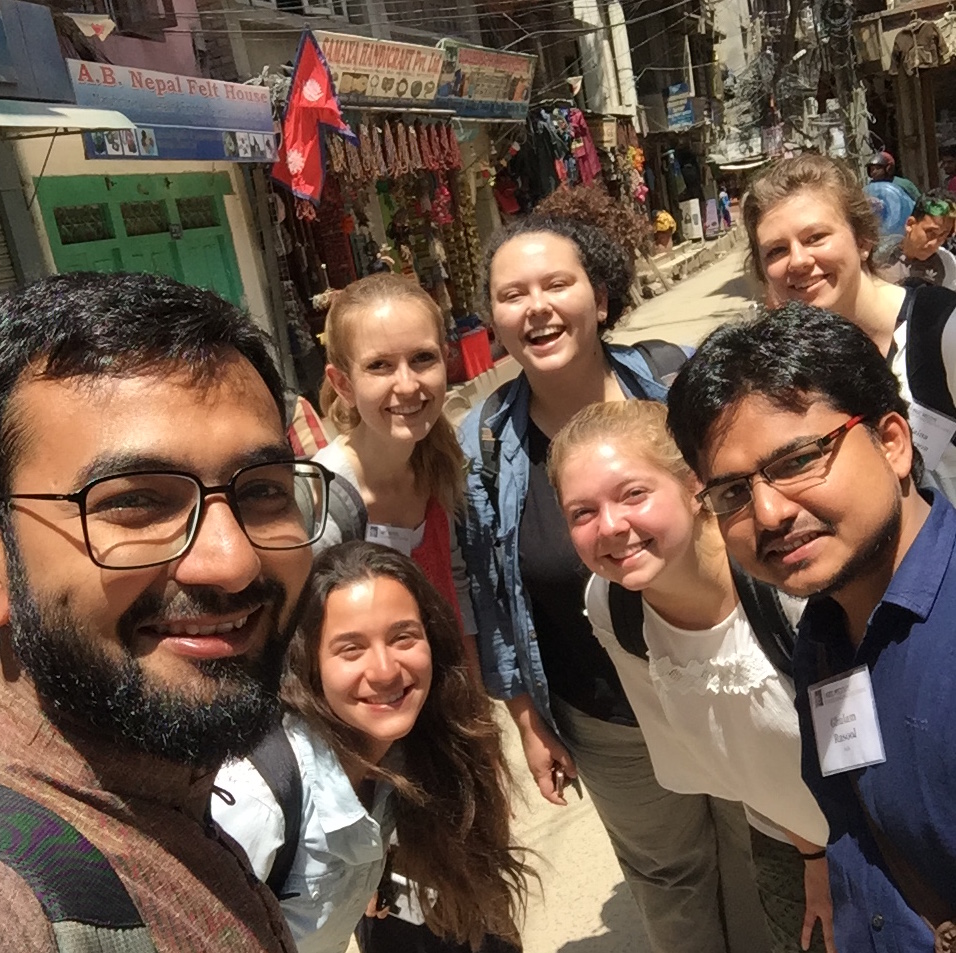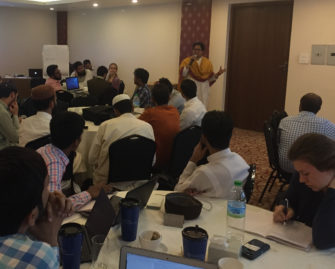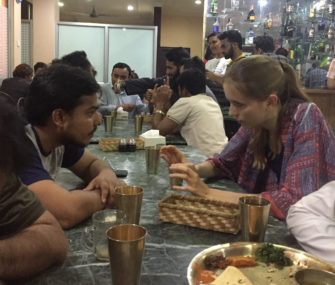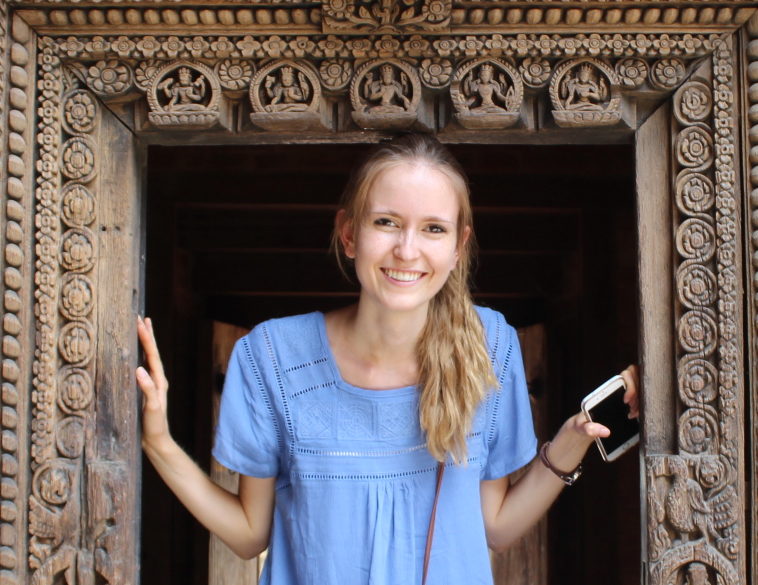
As I entered the Yatri Hotel conference room, the site of the Madrasa Discourses Summer Intensive program, I was taken aback by the unique environment I was about to inhabit for the next fifteen days. Here I was, a female nineteen-year-old Catholic undergraduate student, surrounded by Indian and Pakistani men, and one Pakistani woman, each possessing advanced degrees in Islamic Studies. How would we bridge our interfaith and intercultural divides to engage in meaningful conversation? How could I be an active participant in discussions about Islamic theological renewal when I had so little experience with the subject? I feared I was in over my head.
Little did I know these religious and cultural differences would enrich the program rather than hamper it. The more divergent our views were on a topic, the more we learned from one another. Slowly but surely, friendship and trust replaced wariness and doubt. As each day passed conversations grew in complexity, and the significance of personal identity and “truth” became increasingly apparent.

The concept of identity in the modern world implies intersectionality. We are defined by our genders, nationalities, religions, ethnicities, socioeconomic statuses, sexual orientations, castes, and many other aspects of our lives. The interactions I had with the madrasa graduates clearly displayed the varying weights that these identity markers hold for different individuals. For most of these students, religion is at the core of their identities. It impacts how they view current events, structure their family lives, make moral decisions, and interact with others. Their common Muslim identity is more important than their distinct Indian and Pakistani nationalities, allowing them greater understanding in these intercultural dialogues. While my Catholic faith is a part of my identity, it plays a less significant role in how I approach the world. My code of ethics is more informed by my life experiences than the Bible, and I would likely connect more easily with a Protestant American than a Catholic Argentinian. The centrality of religion in how these students define themselves influences their views on politics, gender roles, and scientific findings.
The importance of Muslim identity was most apparent in our discussions of social inclusion in Nepal. Towards the end of our first week in Kathmandu, we had the opportunity to hear from Dr. Prakash Bhattarai about his work with the Centre for Social Change and the Association of Youth Organizations in Nepal. During a question and answer session, I was surprised by how focused the madrasa graduates were on delineating the role of Muslims in Nepali society. Although Dr. Bhattarai, a graduate of the Kroc Institute’s Masters in Peace Studies, had mentioned how Muslims fit into the caste system in Nepal, often as members of the oppressed Dalit caste, it was far from the heart of his presentation. In any case, students responded with questions about Muslim persecution, whether seats are reserved for Muslims in the Parliament of Nepal, and Nepal’s Muslim population.
The movement of conversation away from policy changes that promote gender equality, improved literacy, and communal harmony towards the current state of affairs for the Muslim minority in Nepal seemed counterintuitive to me. With all the knowledge that Dr. Bhattarai had to share about effective political and social change to bring about greater religious coexistence, why limit the conversation to a discussion of one faith’s prosperity? As a female Peace Studies major, I would not have thought to direct my attention to the welfare of the Catholic minority in Nepal when this lecture could teach me so much about a broader successful social inclusion movement. However, my faith is not at the center of my identity, as it is for many of the madrasa graduates. This experience attuned me to the impact that our identities can have on how we approach opportunities for learning and which narratives we are drawn towards hearing and telling.
The greatest conceptual and cultural challenge I faced during this intensive program stemmed from our differing ideas about “truth.” On our first day of the program, both the madrasa graduates and Notre Dame students were given the opportunity to pose a question towards the group. One madrasa graduate said, “As Muslims, we believe the Qur’an is the Divine Truth, what do you think it is?” This difference in perspective was the greatest stumbling block for me in many of the critical conversations we had over the course of the summer intensive. How could I convey my confidence in scientific truths without dismissing their adherence to the Qur’anic texts? For example, I discussed the importance of natural science education with one student who shared that he had chosen to study biology as part of his secondary education. We bonded over our fascination with genetics and discussed the theory of evolution. To my surprise, he said that despite his knowledge of the subject, he could not accept evolution as truth because it directly contradicts the creation story in the Qur’an. I asked whether he could accept evolution as the means by which God created the first humans, as many Christians now believe, rather than a negation of God’s involvement in the process, but he insisted that the Qur’an is clear and literal in its explanation of the creation of Adam, the first human being. I struggled to come to terms with this standpoint considering the personal experience that this student had with the surmounting evidence supporting evolution. Our disagreement on this issue could not be resolved without one of us adjusting our opposing views on the literal interpretation and infallibility of the Qur’anic verses.

As I sought explanations for this unswaying faith in Scripture over the course of the program, one common justification came to light: The Qur’an is constant, but science and modernity are always changing. Many of these students believe that the Qur’an and Sunnah are the only certain sources of truth, given directly to man by God, and that any other source of knowledge is prone to human error. The verses of Scripture will never change, but researchers will update theories and make new findings on a regular basis. Why should Muslims doubt their stable sacred texts when there is already so much flux in the theories of the modern world? I found this point difficult to debate without challenging the literal inerrancy of the Qur’an, but perhaps that challenge is exactly what I was there to provide. The Madrasa Discourses program aims to facilitate harmony and understanding between traditional Islamic thought and modern scientific and social realities. This goal cannot be accomplished without difficult conversations and confrontations with contrasting perspectives of truth. I hope that presenting my simultaneous belief in modern science and Catholicism allowed the madrasa graduates to reconsider their interpretations of Scripture and recognize the consistency that can exist between modernity and religion.
I left Kathmandu with an intense appreciation for the conversations I had with peers, scholars, and professors. As excited as I was to continue our interfaith and intercultural dialogue throughout the coming year through the Madrasa Discourses Research Lab, I felt that the future of this theological renewal project was largely out of my hands. It was the responsibility of the madrasa graduates to bring the changes we discussed back to their communities to bring about conciliation between tradition and modernity.
Just a week after returning from Nepal, my perception that I played only a supporting role in this journey was challenged by a homily given at my local parish. The priest spoke about how we must stay on the straight and narrow path given to us by God in the face of changing social realities, stating that we may not agree with Church teachings, but we do not get to decide what is right in this world. I was amazed by the similarities between this homily and the Islamic viewpoints, as expressed by the madrasa graduates, that we had been discussing during the intensive. I realized that theological renewal is not limited to the Islamic faith. While there may be more contentions between Islam and modernity, Catholicism certainly has room to grow in its acceptance of modern realities and updating of Scriptural interpretation. In fact, strictly literal readings of the Bible still occur within certain sects of Christianity, so this issue of renewal extends beyond the Islamic faith. As my peers in India and Pakistan are working towards updating their tradition, I will do the same in my faith community. I am confident that the Madrasa Discourses project will play a major role in relieving the tension between religion and modernity, and I am so grateful to the Madrasa Discourses team, Notre Dame International, and the John Templeton Foundation for the opportunity I was given to take part in this work.

